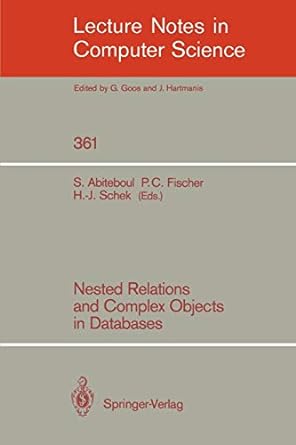ENGINEERING ETHICS
QUESTION
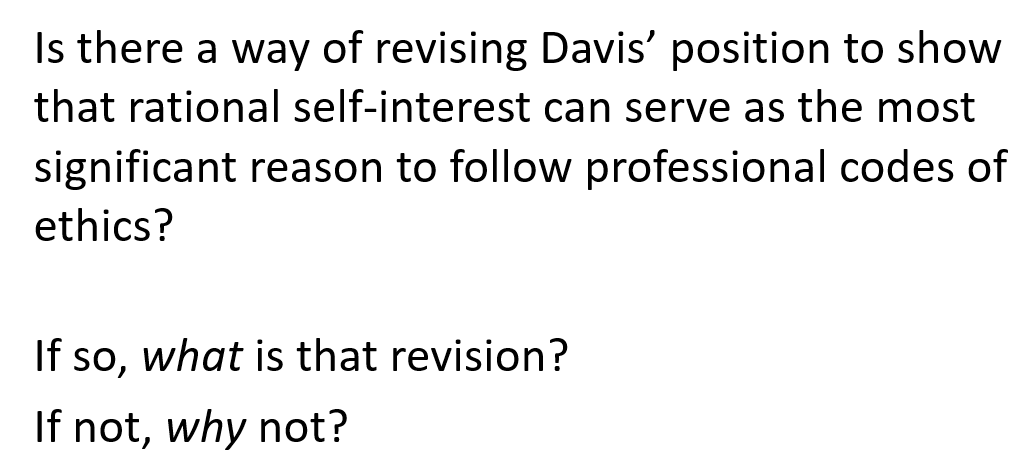
NOTES>>>>
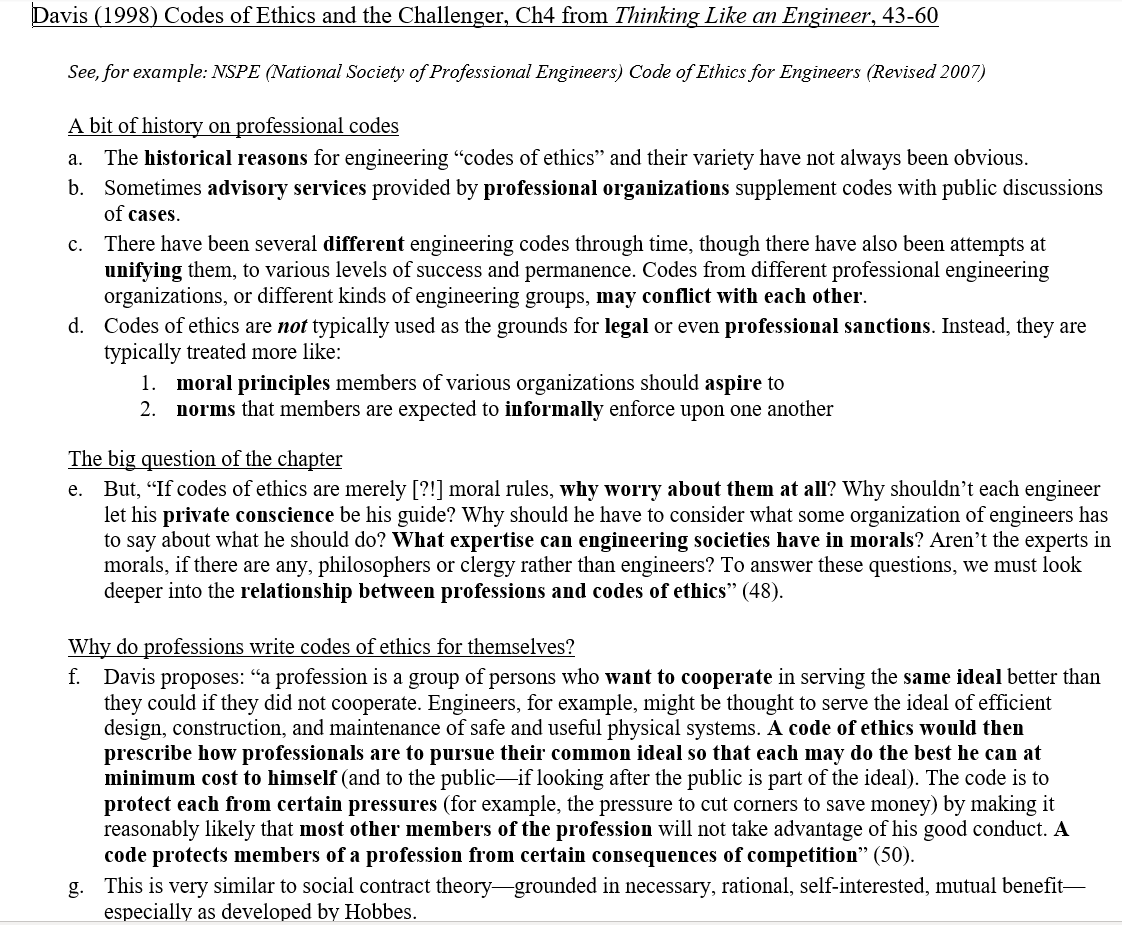
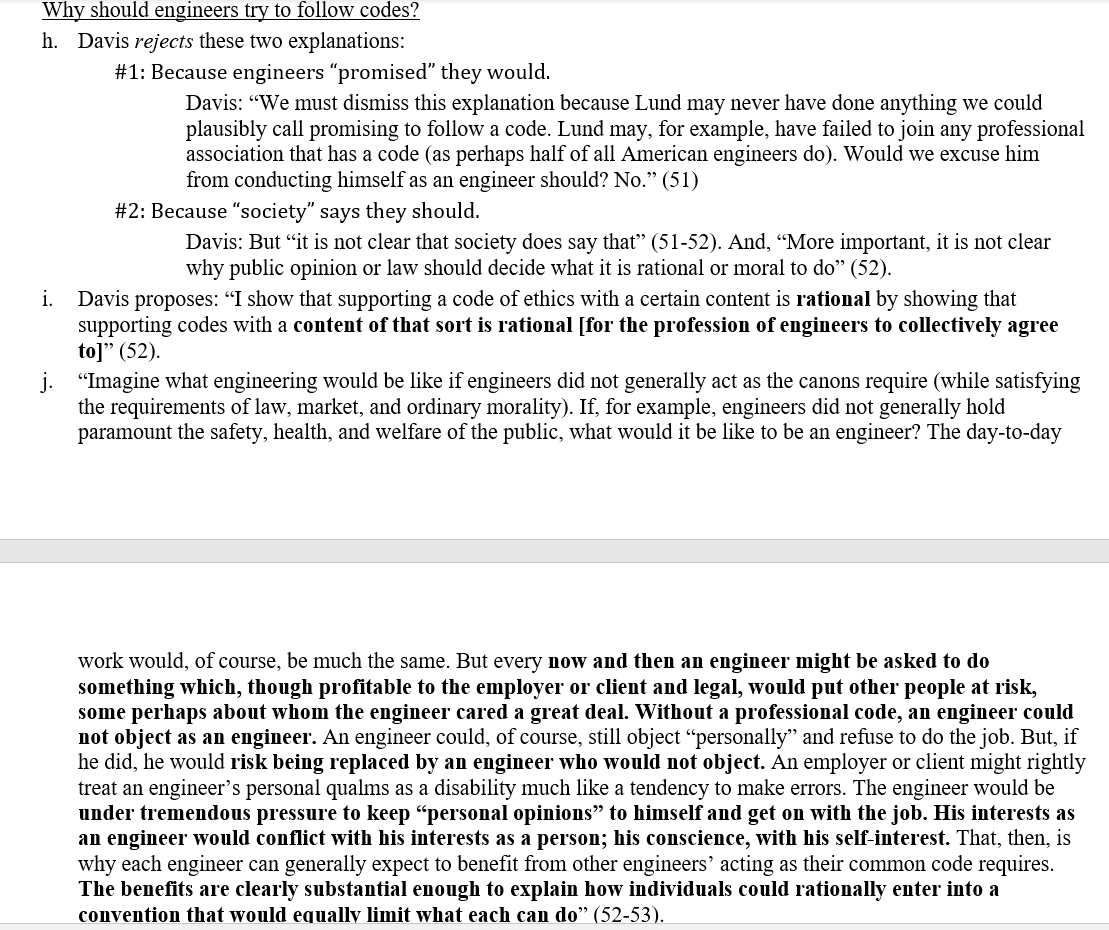
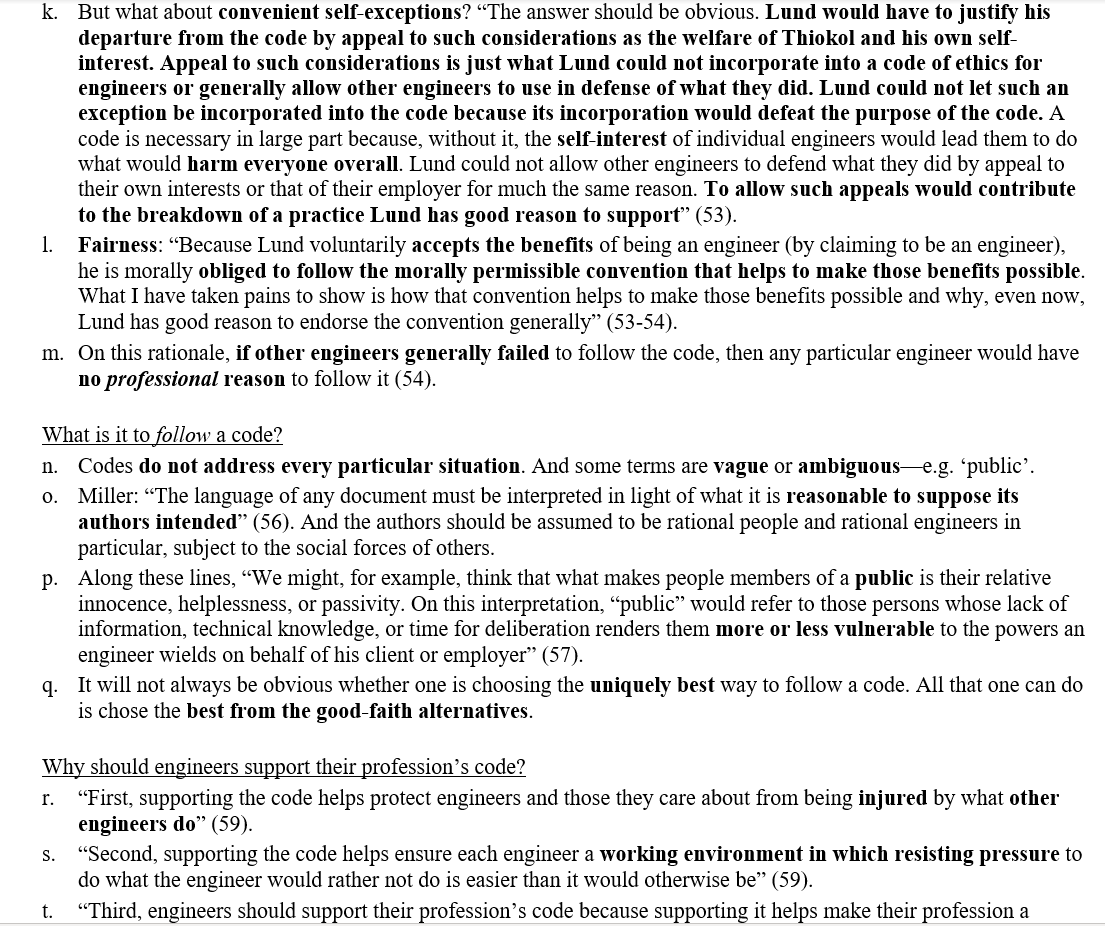
 Thank you !
Thank you !
Is there a way of revising Davis' position to show that rational self-interest can serve as the most significant reason to follow professional codes of ethics? If so, what is that revision? If not, why not? Davis (1998) Codes of Ethics and the Challenger, Ch4 from Thinking Like an Engineer, 43-60 See, for example: NSPE (National Society of Professional Engineers) Code of Ethics for Engineers (Revised 2007) a. A bit of history on professional codes The historical reasons for engineering codes of ethics and their variety have not always been obvious. b. Sometimes advisory services provided by professional organizations supplement codes with public discussions of cases. C. There have been several different engineering codes through time, though there have also been attempts at unifying them, to various levels of success and permanence. Codes from different professional engineering organizations, or different kinds of engineering groups, may conflict with each other. d. Codes of ethics are not typically used as the grounds for legal or even professional sanctions. Instead, they are typically treated more like: 1. moral principles members of various organizations should aspire to 2. norms that members are expected to informally enforce upon one another e. The big question of the chapter But, If codes of ethics are merely [?!] moral rules, why worry about them at all? Why shouldn't each engineer let his private conscience be his guide? Why should he have to consider what some organization of engineers has to say about what he should do? What expertise can engineering societies have in morals? Aren't the experts in morals, if there are any, philosophers or clergy rather than engineers? To answer these questions, we must look deeper into the relationship between professions and codes of ethics (48). Why do professions write codes of ethics for themselves? f. Davis proposes: a profession is a group of persons who want to cooperate in serving the same ideal better than they could if they did not cooperate. Engineers, for example, might be thought to serve the ideal of efficient design, construction, and maintenance of safe and useful physical systems. A code of ethics would then prescribe how professionals are to pursue their common ideal so that each may do the best he can at minimum cost to himself (and to the publicif looking after the public is part of the ideal). The code is to protect each from certain pressures (for example, the pressure to cut corners to save money) by making it reasonably likely that most other members of the profession will not take advantage of his good conduct. A code protects members of a profession from certain consequences of competition (50). g. This is very similar to social contract theory-grounded in necessary, rational, self-interested, mutual benefit- especially as developed by Hobbes. Why should engineers try to follow codes? h. Davis rejects these two explanations: #1: Because engineers promised they would. Davis: We must dismiss this explanation because Lund may never have done anything we could plausibly call promising to follow a code. Lund may, for example, have failed to join any professional association that has a code (as perhaps half of all American engineers do). Would we excuse him from conducting himself as an engineer should? No. (51) #2: Because society says they should. Davis: But it is not clear that society does say that (51-52). And, More important, it is not clear why public opinion or law should decide what it is rational or moral to do (52). i. Davis proposes: I show that supporting a code of ethics with a certain content is rational by showing that supporting codes with a content of that sort is rational (for the profession of engineers to collectively agree to) (52). j. "Imagine what engineering would be like if engineers did not generally act as the canons require (while satisfying the requirements of law, market, and ordinary morality). If, for example, engineers did not generally hold paramount the safety, health, and welfare of the public, what would it be like to be an engineer? The day-to-day work would, of course, be much the same. But every now and then an engineer might be asked to do something which, though profitable to the employer or client and legal, would put other people at risk, some perhaps about whom the engineer cared a great deal. Without a professional code, an engineer could not object as an engineer. An engineer could, of course, still object personally and refuse to do the job. But, if he did, he would risk being replaced by an engineer who would not object. An employer or client might rightly treat an engineer's personal qualms as a disability much like a tendency to make errors. The engineer would be under tremendous pressure to keep personal opinions to himself and get on with the job. His interests as an engineer would conflict with his interests as a person; his conscience, with his self-interest. That, then, is why each engineer can generally expect to benefit from other engineers' acting as their common code requires. The benefits are clearly substantial enough to explain how individuals could rationally enter into a convention that would equally limit what each can do" (52-53). k. But what about convenient self-exceptions? The answer should be obvious. Lund would have to justify his departure from the code by appeal to such considerations as the welfare of Thiokol and his own self- interest. Appeal to such considerations is just what Lund could not incorporate into a code of ethics for engineers or generally allow other engineers to use in defense of what they did. Lund could not let such an exception be incorporated into the code because its incorporation would defeat the purpose of the code. A code is necessary in large part because, without it, the self-interest of individual engineers would lead them to do what would harm everyone overall. Lund could not allow other engineers to defend what they did by appeal to their own interests or that of their employer for much the same reason. To allow such appeals would contribute to the breakdown of a practice Lund has good reason to support (53). 1. Fairness: Because Lund voluntarily accepts the benefits of being an engineer (by claiming to be an engineer), he is morally obliged to follow the morally permissible convention that helps to make those benefits possible. What I have taken pains to show is how that convention helps to make those benefits possible and why, even now, Lund has good reason to endorse the convention generally (53-54). m. On this rationale, if other engineers generally failed to follow the code, then any particular engineer would have no professional reason to follow it (54). What is it to follow a code? n. Codes do not address every particular situation. And some terms are vague or ambiguouse.g. public'. 0. Miller: The language of any document must be interpreted in light of what it is reasonable to suppose its authors intended (56). And the authors should be assumed to be rational people and rational engineers in particular, subject to the social forces of others. p. Along these lines, We might, for example, think that what makes people members of a public is their relative innocence, helplessness, or passivity. On this interpretation, public would refer to those persons whose lack of information, technical knowledge, or time for deliberation renders them more or less vulnerable to the powers an engineer wields on behalf of his client or employer (57). q. It will not always be obvious whether one is choosing the uniquely best way to follow a code. All that one can do is chose the best from the good-faith alternatives. r. Why should engineers support their profession's code? First, supporting the code helps protect engineers and those they care about from being injured by what other engineers do (59). S. Second, supporting the code helps ensure each engineer a working environment in which resisting pressure to do what the engineer would rather not do is easier than it would otherwise be (59). Third, engineers should support their profession's code because supporting it helps make their profession a t. r. Why should engineers support their profession's code? "First, supporting the code helps protect engineers and those they care about from being injured by what other engineers do (59). S. Second, supporting the code helps ensure each engineer a working environment in which resisting pressure to do what the engineer would rather not do is easier than it would otherwise be (59). Third, engineers should support their profession's code because supporting it helps make their profession a practice about which they need feel no morally justified embarrassment, shame, or guilt (59-60). And fourth, considerations of fairness call on an engineer to take on his share of these additional responsibilities insofar as other engineers do the same and he (by claiming to be an engineer) benefits from their doing so" (60) t. u. Is there a way of revising Davis' position to show that rational self-interest can serve as the most significant reason to follow professional codes of ethics? If so, what is that revision? If not, why not? Davis (1998) Codes of Ethics and the Challenger, Ch4 from Thinking Like an Engineer, 43-60 See, for example: NSPE (National Society of Professional Engineers) Code of Ethics for Engineers (Revised 2007) a. A bit of history on professional codes The historical reasons for engineering codes of ethics and their variety have not always been obvious. b. Sometimes advisory services provided by professional organizations supplement codes with public discussions of cases. C. There have been several different engineering codes through time, though there have also been attempts at unifying them, to various levels of success and permanence. Codes from different professional engineering organizations, or different kinds of engineering groups, may conflict with each other. d. Codes of ethics are not typically used as the grounds for legal or even professional sanctions. Instead, they are typically treated more like: 1. moral principles members of various organizations should aspire to 2. norms that members are expected to informally enforce upon one another e. The big question of the chapter But, If codes of ethics are merely [?!] moral rules, why worry about them at all? Why shouldn't each engineer let his private conscience be his guide? Why should he have to consider what some organization of engineers has to say about what he should do? What expertise can engineering societies have in morals? Aren't the experts in morals, if there are any, philosophers or clergy rather than engineers? To answer these questions, we must look deeper into the relationship between professions and codes of ethics (48). Why do professions write codes of ethics for themselves? f. Davis proposes: a profession is a group of persons who want to cooperate in serving the same ideal better than they could if they did not cooperate. Engineers, for example, might be thought to serve the ideal of efficient design, construction, and maintenance of safe and useful physical systems. A code of ethics would then prescribe how professionals are to pursue their common ideal so that each may do the best he can at minimum cost to himself (and to the publicif looking after the public is part of the ideal). The code is to protect each from certain pressures (for example, the pressure to cut corners to save money) by making it reasonably likely that most other members of the profession will not take advantage of his good conduct. A code protects members of a profession from certain consequences of competition (50). g. This is very similar to social contract theory-grounded in necessary, rational, self-interested, mutual benefit- especially as developed by Hobbes. Why should engineers try to follow codes? h. Davis rejects these two explanations: #1: Because engineers promised they would. Davis: We must dismiss this explanation because Lund may never have done anything we could plausibly call promising to follow a code. Lund may, for example, have failed to join any professional association that has a code (as perhaps half of all American engineers do). Would we excuse him from conducting himself as an engineer should? No. (51) #2: Because society says they should. Davis: But it is not clear that society does say that (51-52). And, More important, it is not clear why public opinion or law should decide what it is rational or moral to do (52). i. Davis proposes: I show that supporting a code of ethics with a certain content is rational by showing that supporting codes with a content of that sort is rational (for the profession of engineers to collectively agree to) (52). j. "Imagine what engineering would be like if engineers did not generally act as the canons require (while satisfying the requirements of law, market, and ordinary morality). If, for example, engineers did not generally hold paramount the safety, health, and welfare of the public, what would it be like to be an engineer? The day-to-day work would, of course, be much the same. But every now and then an engineer might be asked to do something which, though profitable to the employer or client and legal, would put other people at risk, some perhaps about whom the engineer cared a great deal. Without a professional code, an engineer could not object as an engineer. An engineer could, of course, still object personally and refuse to do the job. But, if he did, he would risk being replaced by an engineer who would not object. An employer or client might rightly treat an engineer's personal qualms as a disability much like a tendency to make errors. The engineer would be under tremendous pressure to keep personal opinions to himself and get on with the job. His interests as an engineer would conflict with his interests as a person; his conscience, with his self-interest. That, then, is why each engineer can generally expect to benefit from other engineers' acting as their common code requires. The benefits are clearly substantial enough to explain how individuals could rationally enter into a convention that would equally limit what each can do" (52-53). k. But what about convenient self-exceptions? The answer should be obvious. Lund would have to justify his departure from the code by appeal to such considerations as the welfare of Thiokol and his own self- interest. Appeal to such considerations is just what Lund could not incorporate into a code of ethics for engineers or generally allow other engineers to use in defense of what they did. Lund could not let such an exception be incorporated into the code because its incorporation would defeat the purpose of the code. A code is necessary in large part because, without it, the self-interest of individual engineers would lead them to do what would harm everyone overall. Lund could not allow other engineers to defend what they did by appeal to their own interests or that of their employer for much the same reason. To allow such appeals would contribute to the breakdown of a practice Lund has good reason to support (53). 1. Fairness: Because Lund voluntarily accepts the benefits of being an engineer (by claiming to be an engineer), he is morally obliged to follow the morally permissible convention that helps to make those benefits possible. What I have taken pains to show is how that convention helps to make those benefits possible and why, even now, Lund has good reason to endorse the convention generally (53-54). m. On this rationale, if other engineers generally failed to follow the code, then any particular engineer would have no professional reason to follow it (54). What is it to follow a code? n. Codes do not address every particular situation. And some terms are vague or ambiguouse.g. public'. 0. Miller: The language of any document must be interpreted in light of what it is reasonable to suppose its authors intended (56). And the authors should be assumed to be rational people and rational engineers in particular, subject to the social forces of others. p. Along these lines, We might, for example, think that what makes people members of a public is their relative innocence, helplessness, or passivity. On this interpretation, public would refer to those persons whose lack of information, technical knowledge, or time for deliberation renders them more or less vulnerable to the powers an engineer wields on behalf of his client or employer (57). q. It will not always be obvious whether one is choosing the uniquely best way to follow a code. All that one can do is chose the best from the good-faith alternatives. r. Why should engineers support their profession's code? First, supporting the code helps protect engineers and those they care about from being injured by what other engineers do (59). S. Second, supporting the code helps ensure each engineer a working environment in which resisting pressure to do what the engineer would rather not do is easier than it would otherwise be (59). Third, engineers should support their profession's code because supporting it helps make their profession a t. r. Why should engineers support their profession's code? "First, supporting the code helps protect engineers and those they care about from being injured by what other engineers do (59). S. Second, supporting the code helps ensure each engineer a working environment in which resisting pressure to do what the engineer would rather not do is easier than it would otherwise be (59). Third, engineers should support their profession's code because supporting it helps make their profession a practice about which they need feel no morally justified embarrassment, shame, or guilt (59-60). And fourth, considerations of fairness call on an engineer to take on his share of these additional responsibilities insofar as other engineers do the same and he (by claiming to be an engineer) benefits from their doing so" (60) t. u




 Thank you !
Thank you !





